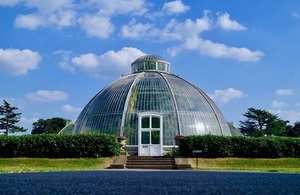Bill introduced to allow Kew to bloom for new generations
The Kew Gardens (Leases) No. 3 Bill will allow Kew Botanic Gardens to prosper for centuries to come.

A picture of a greenhouse at Kew Botanic Gardens surrounded by manicured hedges and flowerpots.
A new Bill which will allow Kew Botanic Gardens to prosper for centuries to come and generate up to £15 million in new income has been introduced in Parliament today.
The Kew Gardens (Leases) No. 3 Bill extends the maximum allowable lease on Kew Gardens’ land from the current 31 years to 150 years.
The historical legislation restricts the length of leases on Kew’s estate – making it difficult for the Gardens to generate commercial interest and investment in the culturally important 18th century buildings that face Kew Green.
By extending the lease, Kew Gardens can open up new streams of revenue – estimated to be up to £15 million in the first 10 years – and allow the public to enjoy all elements of the history and beauty of this 132-hectare UNESCO World Heritage Site.
Lord Gardiner, Minister for Kew Gardens, said:
Kew Gardens is one of the world’s most iconic botanical gardens, home to beautiful grounds, historical buildings, extraordinary collection of flora and a scientific institution of global renown.
I am pleased to introduce this Bill to the House, which will help Kew in boosting revenue and, thereby providing a further lasting legacy for this UNESCO World Heritage Site and ensuring generations of visitors can experience this exceptional British landmark for years to come.
Richard Deverell, Director Royal Botanic Gardens, Kew said:
The passing of this new Bill offers Kew an excellent opportunity to attract private investment that will help ensure that we have an estate that supports the needs of the botanic gardens, the scientific team and our visitors for many years to come.
The Royal Botanic Gardens, Kew, is a world-famous scientific organisation, internationally respected for its outstanding collections as well as its scientific expertise in plant diversity, conservation and sustainable development in the UK and around the globe.
A major international and a top London visitor attraction, Kew attracts over 2.1 million visits every year.